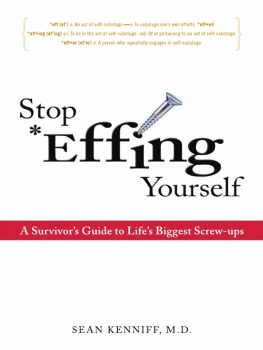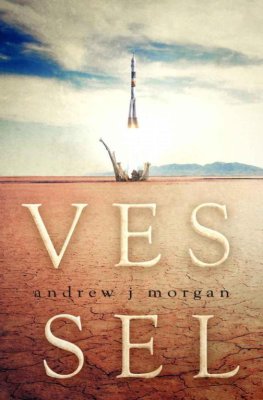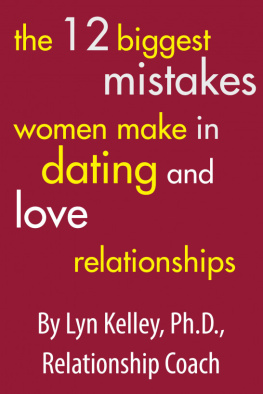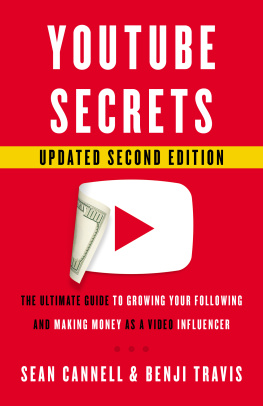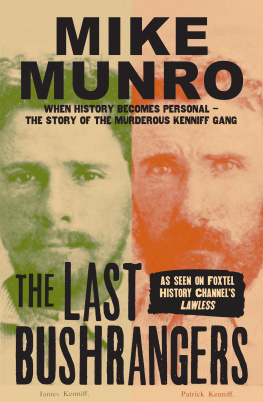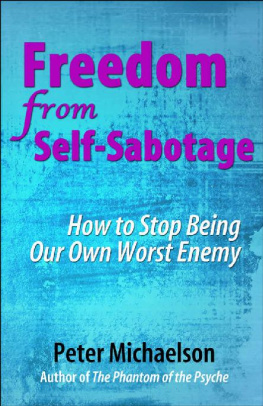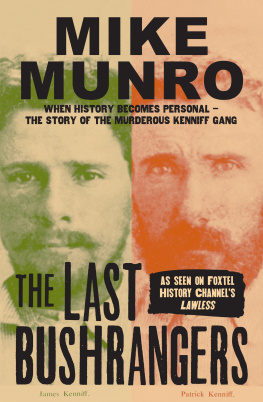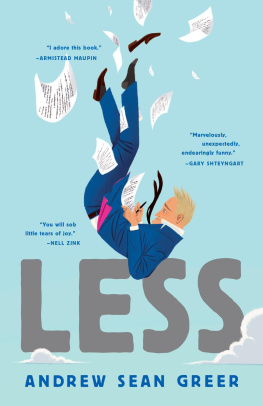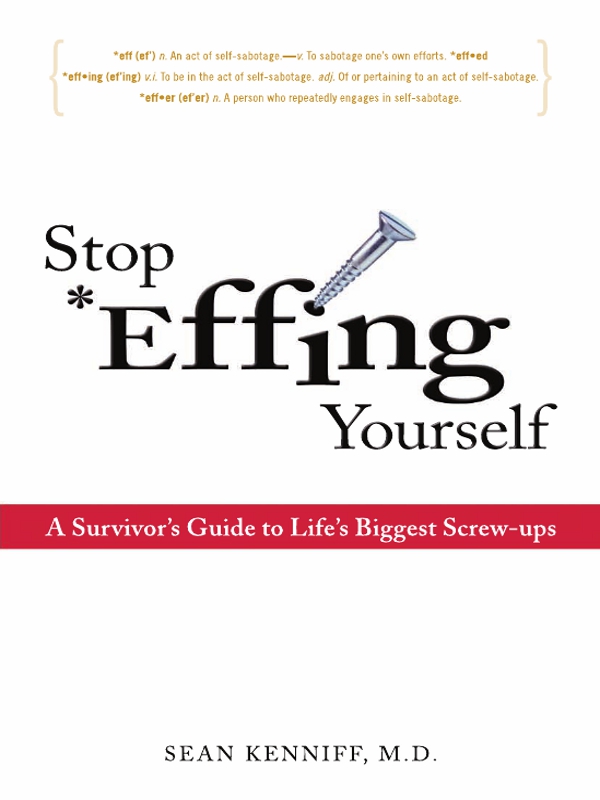

SEAN KENNIFF, M.D.

www.hcibooks.com
Library of Congress Cataloging-in-Publication Data
Kenniff, Sean.
Stop *effing yourself : a survivors guide to lifes biggest screw-ups /
Sean Kenniff.
p. cm.
Includes bibliographical references.
eISBN-13: 978-0-7573-9365-5 eISBN-10: 0-7573-9365-9
1. Self-defeating behavior. 2. Failure (Psychology) 3. SuccessPsychological aspects. I. Title.
BF637.S8K42 2010
158.1dc22
2010008464
2010 Sean Kenniff
All rights reserved. Printed in the United States of Amer ica. No part of this publication may be reproduced, stored in a retrieval system, or transmitted in any form or by any means, electronic, mechanical, photo copying, recording, or otherwise, without the written permission of the publisher.
HCI, its logos, and marks are trademarks of Health Communications, Inc.
Publisher: Health Communications, Inc.
3201 S.W. 15th Street
Deerfield Beach, FL 334428190
Cover and interior designs by Lawna Patterson Oldfield
Contents
*eff (ef)n. An act of self-sabotage.v. To sabotage ones own efforts. *effed.
*effing (efing)v.i. To be in the act of self-sabotage.
adj. Of or pertaining to an act of self-sabotage.
*effer (efr)n. A person who repeatedly engages in self-sabotage.
Nobody knew it, but I had a huge *effing problem...
Thats not easy to admit, because to the outside observer, my life looks pretty remarkable. Im a doctora neurologistand a good one. Im fit and thankfully healthy. I earn a handsome salary. I starred on the nations number one television showthe first season of Survivorand I have made guest appearances on many other popular programs. Ive met scores of celebrities, movers, and shakers. Ive appeared in a movie and acted in a soap opera. Millions of Americans watched me each week as I reported important health news on a major television network, and I had my own health advice column in a prominent U.S. daily newspaper. I have my own radio show. Ive dated kind, spectacular, and brilliant women. I have a wonderful family, devoted friends, and fewif anyenemies. And along the way Ive managed to change several livesand Ive saved a few too. Sounds pretty good, right?
I hid my secret well.
On the inside things were very different. I had no idea how much money I had in the bank. I had no growing investments. I didnt own my car or my home. I had little savings. I owed the IRS some moneyokay, make that a lot of money. My romantic life was in shambles, and like many men I had no clue what I was doing wrong. I had stopped exercising. I was gaining weight. I spent too much time drinking beer with my buddies. My body was hurting in weird places. I wasnt sleeping well. I was unhappy and stressed a lot of the time. I felt like a frauda house of cards teetering on collapse. Every day I lived in fear that my inadequacies would be discovered. Sooner or later someone would see my string, start pulling, and Id unravel like a spool of yarn. I was paralyzed by uncertainty and insecurity. In a nutshell, I felt miserable about myself. So I did what anybody would do I watched a lot of Oprah. But my problem was way beyond Oprahs powerful pick-me-ups; it was even beyond the tough talk of Dr. Phil. I was a world-class self-saboteur, and I was royally *effed.
This was self-sabotage. These messes were mine.

Leading up to the turn of the millennium, I skipped out on some of my student loan payments because I thought the Y2K computer glitch might wipe away my educational debt.
I dont know what triggered that revelation, but one day, after years of ignorance, it happened. I decided to take a personal inventory. It was an honest and unpleasant analysis of who I was, what I wanted to be, and what I had become. From my early twenties to my early thirties, I had accomplished a lot but had grown very little. My impulsive inner child was not only running my life but ruining it. Some people, as Pablo Picasso famously did, can harness that inner child to create breathtaking bursts of artistry. But my inner child was, in fact, a problem childand it was turning me into a problem adult.
For years I chose to spend out of control, and I failed to save money or invest it wisely. I chose to work long hours. I chose to put limits and strains on romantic relationships. I failed to nurture important friendships. I failed to prioritize a healthy diet and exercise plan. I chose stress over simplicity. I chose haplessness and helplessness over happiness. And time after time when I was given opportunities to improve my situation, I either failed to act, or I chose actions that would make it harder for me to achieve my goals. From the moment I had my revelation, it was clear: if I wanted to start living my dreams, I had to first stop living my delusions.
My inner child was a problem childand it was turning me into a problem adult.
And I needed to stop immediately.
There are many fascinating psychological theories on why people sabotage their own efforts. For me its a combination of things: fear of success, fear of failure, insecurity, some guilty feelings, and a dash of complacency. After reviewing the available science and analyzing countless acts of self-sabotage in my own life, I am now convinced that we all have an inner voice that is discouraging, distracting, demanding, and damaging. Some experts call this voice the internal enemy, and by listening to this internal enemy, we engage in self-defeating behaviors. I was surprised to learn that self-sabotage provides some emotional and psychological comforts; for one, it allows us to stay the same. Emotional growth requires change, and it is always uncomfortable, and self-sabotage may be some sort of ego-preserving psychological default setting. But you dont have to listen to that internal enemy, and you can even change your internal enemy into an ally if you know how to do it. And thats what Stop *Effing Yourself is about.
If my story sounds familiar to you, then this book is going to be tremendously helpful. For my own personal struggle with self-sabotage, I scoured the scientific literature and enlisted the help of renowned experts in health, personal finance, career building, relationships, and romance. The valuable insight and guidance I received is provided in the following chapters. Unlike other books written on self-sabotage, Stop *Effing Yourself will help you recognize the patterns in your own life, identify the ten biggest *effing problems you might be making in key life areas, and provide you with ten explicit *effing solutions. Stop *Effing Yourself is not just a self-help bookit is a how-to manual.
Now let me ask you something...
Do You Have an *Effing Problem?
To *eff is human. We all self-sabotage from time to time, but some people do it more frequently and with more gusto than others. Self-sabotage guarantees failure. That does not mean that people who sabotage themselves are failures; in fact, quite the opposite is true. Many people with big *effing problems are driven, intelligent, artistic, and thoughtful people, but they just never complete those critical final steps to lifelong success.
Next page
